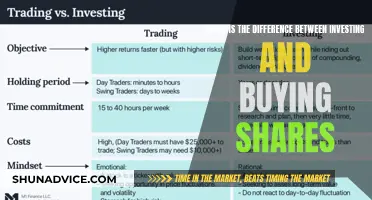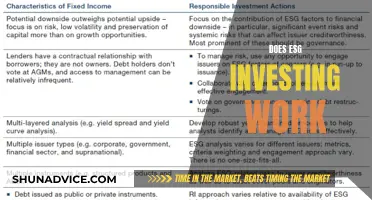
Paying off your mortgage or investing extra cash is a common dilemma for homeowners. The answer depends on your financial situation, risk tolerance, and personal preferences.
Paying off your mortgage early can save you thousands of dollars in interest and provide peace of mind. On the other hand, investing in stocks or retirement funds can offer higher returns, liquidity, and potential employer matches.
Consider your mortgage rate, expected investment returns, and financial goals when deciding. If you can afford to do both, you can make extra payments on your mortgage while also investing.
Consulting a financial advisor can help you assess your finances and make an informed decision.
| Characteristics | Values |
|---|---|
| Risk tolerance | Depends on the individual |
| Retirement planning | Closer to retirement, paying off mortgage may be better |
| Interest rates | High-interest rates are a priority to pay off |
| Financial situation | Depends on individual circumstances |
| Investment returns | Compare to mortgage interest rates |
| Tax deductions | Loss of tax deductions for mortgage interest |
| Prepayment penalties | May incur a penalty for paying off mortgage early |
| Emergency fund | Need enough liquid assets to cover emergencies |
| Debt repayment | May be smarter to pay down mortgage at the beginning of the loan to avoid paying more interest |
| Peace of mind | Being debt-free may ease your burden |
| Investment gains | Gains may exceed interest paid on mortgage |
| Opportunity cost | Paying off mortgage early may be at the expense of retirement savings or other financial goals |
| Liquidity | Property is an illiquid asset |
| Volatility | Stock market is more volatile than housing market |
What You'll Learn
- Paying off your mortgage early can save you thousands in interest
- Paying off your mortgage can give you peace of mind
- You can leverage your equity if you pay off a large chunk of your mortgage early
- Investments are typically more liquid than money tied up in your home
- If you have a low mortgage rate, investing may be more profitable

Paying off your mortgage early can save you thousands in interest
When you take out a mortgage, your monthly payments are split between the principal (the amount of money you originally borrowed) and interest. During the first few years of your loan, most of your payments go towards interest. As you pay down the principal, you owe less in interest. At the end of your loan term, a larger percentage of your payment goes towards the principal.
If you pay off your mortgage early, you can save thousands of dollars in interest. For example, let's say you borrow $150,000 to buy a home at a 6% interest rate with a 30-year term. By the time you pay off your loan, you will have paid a total of $173,757.28 in interest. Now, let's say that you pay an extra $100 every month towards the loan. At the end of the term, you will have paid $128,170.57 in interest, saving you $45,586.71. You will also pay off your loan 81 months earlier.
Another strategy to pay off your mortgage early is to switch to a biweekly payment schedule. For example, if your monthly mortgage payment is $1,000, you would pay $500 every two weeks. This adds up to 13 payments a year instead of 12, helping you pay off your debt faster without straining your budget.
Committing to making one extra payment a year can also help you pay off your mortgage early. If you are able, consider using your tax refund to make this extra payment.
Finally, if you have built up significant equity in your home, you may want to consider refinancing to a shorter-term loan. This will increase your monthly payments but will help you save money on interest and fully own your home much faster.
While paying off your mortgage early can save you money in interest, it is important to consider your financial situation and goals before making a decision. Some people may prioritize investing their money elsewhere or paying off other debts with higher interest rates. It is also important to have an emergency fund and retirement savings in place before focusing on paying off your mortgage early.
Starbucks Stock: Buy or Bye?
You may want to see also

Paying off your mortgage can give you peace of mind
Paying off your mortgage early can also increase the equity you have in your home. This can be advantageous if you want to take out a home equity loan or home equity line of credit (HELOC) to accomplish other financial goals, such as making improvements to your home that could increase its value.
Additionally, once your mortgage is paid off, you'll have more room in your budget to invest in other things. You can use the money you were previously spending on mortgage payments for other purposes, such as investing in your future or pursuing personal hobbies.
However, it's important to consider the potential opportunity cost of paying off your mortgage early. Any extra money you put towards your mortgage is money that you're not investing in other financial goals, such as retirement savings or emergency funds. Additionally, paying off your mortgage early may result in the loss of some tax deductions and could be considered an illiquid investment, as accessing that money would require selling your home.
Airlines: Where to Invest Now
You may want to see also

You can leverage your equity if you pay off a large chunk of your mortgage early
Paying off a large chunk of your mortgage early can be a good idea if you want to leverage your equity. By doing so, you can access a home equity line of credit (HELOC) or opt for a cash-out refinance to fund home renovations or other financial goals.
A HELOC is a line of credit secured by your home. It functions like a personal line of credit, allowing you to borrow up to a certain limit and make repayments as you see fit. This option is suitable if you want the flexibility to borrow against your home equity without immediate plans for the funds. However, HELOCs come with variable interest rates, so your payments may increase if rates rise.
On the other hand, a cash-out refinance involves taking on a new loan to pay off your existing mortgage and accessing the equity as cash. This option may be preferable if you want a lump sum of cash to fund specific expenses, such as home improvements. Keep in mind that refinancing comes with closing costs and could result in a higher interest rate on your new loan.
Before making a decision, carefully consider the pros and cons of each option and evaluate your financial situation and goals. Consult a financial advisor to help you make an informed choice that aligns with your specific circumstances.
Smart Ways to Invest $1,000
You may want to see also

Investments are typically more liquid than money tied up in your home
When deciding whether to pay off your mortgage or invest, it's important to consider your financial situation, risk tolerance, and investment goals. One key factor to consider is liquidity, which refers to how easily you can access your money. Investments are generally more liquid than money tied up in your home, offering several advantages:
Higher Liquidity
Stocks, bonds, and similar investments are more liquid than a mortgage. If you need cash quickly, selling stocks or other investments is typically faster and easier than selling your home or doing a cash-out refinance. This liquidity provides flexibility and access to funds in case of emergencies or unexpected expenses.
Potential for Higher Returns
Investing in the stock market or other riskier assets can offer the potential for higher returns compared to the average mortgage interest rate. Historically, the stock market has provided higher average returns than mortgage rates, increasing your future wealth. However, it's important to remember that investing in the stock market comes with higher risk and volatility.
Employer Match
If you invest in a retirement account, such as a 401(k), and your employer offers a match, you can take advantage of this benefit. Employer matching is essentially free money that can boost your retirement savings. Additionally, investing pre-tax dollars in a retirement account can lower your taxable income.
Compound Interest
Starting to invest early allows you to take advantage of compound interest, where you earn interest on your initial investment as well as the accumulated interest from previous periods. The earlier you start, the more time your investments have to grow, potentially resulting in higher returns over the long term.
Diversification
Investing allows you to diversify your portfolio and spread your risk across various assets. By investing in stocks, bonds, mutual funds, or other vehicles, you reduce the impact of any single investment's performance on your overall portfolio. Diversification can help balance risk and improve long-term returns.
While investing offers these benefits, it's important to remember that it also carries higher risk and volatility compared to paying off your mortgage early. It's essential to carefully consider your financial situation, risk tolerance, and investment goals before making any decisions. Consulting a financial advisor can help you make an informed choice that aligns with your specific circumstances.
AI-Assisted Investing: The Future of Finance
You may want to see also

If you have a low mortgage rate, investing may be more profitable
For example, if your mortgage rate is 3% and the average yearly return on investments is 8%, it makes more sense to invest the money. Even after accounting for the 3% mortgage rate, you are still making 5%. Over time, this can result in significant gains.
Additionally, investing in liquid assets such as stocks provides more financial flexibility. You can typically sell your positions quickly when you need money for urgent expenses. On the other hand, paying off your mortgage early ties up your money in a non-liquid asset, making it difficult to access cash in case of financial emergencies.
However, it's important to note that investing carries more risk than paying off your mortgage. The stock market is volatile, and there is no guarantee of returns. You could lose money in some years, especially if you are not a long-term investor.
Therefore, when deciding whether to pay off your mortgage or invest, consider your risk tolerance, financial goals, and current circumstances. If you are risk-averse or prefer the peace of mind of being debt-free, paying off your mortgage early may be a better option. But if you are comfortable with risk and prioritising long-term financial goals, investing may be the more profitable choice, especially with today's low mortgage rates.
Invest or Repay Student Loans: Navigating the Financial Crossroads
You may want to see also
Frequently asked questions
Paying off your mortgage can save you thousands of dollars in interest, you'll be debt-free, and you can leverage your equity.
You could cut into savings, it might be your only investment, and you'll lose tax deductions.
The pros of investing are that you'll see a higher rate of return, you're increasing your future wealth, and there's better asset liquidity. The cons are that investing is riskier, you're still making payments, and investing doesn't make your debt go away.







